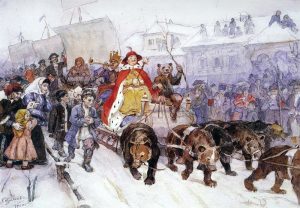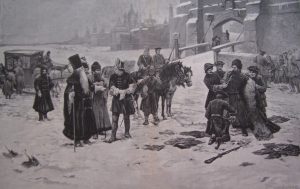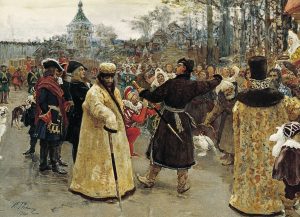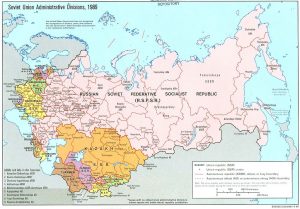Russia is like a guy showing up to a Mexican standoff wearing only his sombrero and demanding to be recognized as the best-dressed man on the planet. But dude, says the US, you got no clothes! Shut up or I’ll blow your head off, screams Russia. But then I’ll blow YOUR head off, America answers, baffled. Yes, but to me it’s worth it! And my gun fires magic bullets that will paralyze your trigger finger, too, Russia babbles incoherently.
To understand why regional, let alone global superpowers have been so exceedingly rare in history, one must ponder on the definition of a superpower. I like to think of them as coherent geopolitical entities that simultaneously and contemporaneously achieve undisputed dominance in their military, techno-economical, and cultural prowess in their region, or in fact across the entire globe. Global superpowers were only made possible by the technological advances of the industrial revolution, specifically steam engines and telegraph, as these advances made it possible for countries to compete globally rather than regionally.
In late antiquity, only two regional superpowers existed: the Roman and the Chinese empires. While others, notably the Mongolians could lay claim to military superiority, none met the trifecta of conditions stipulated above. The Romans and the Chinese did, in the Mediterranean basin and in the Far East, respectively. Since the Renaissance, I would argue that only the United States of America has ever reached the status of a regional or global superpower, with Great Britain in its heyday of the early Victorian era coming quite close, but never really achieving that exalted status.
In Victorian times, Britain was certainly the dominant technological and economic power on the globe and its cultural footprint was unprecedented, but its small size and inability to field a large continental army meant that it could never achieve the military dominance that is required of a true superpower. In fact, France, Prussia (later Germany), the Russian Empire, and even the US had bigger military forces than Britain throughout the 19th and 20th centuries. Ever since the end of WWII and through the present, it was the US and only the US that could lay claim to global superpower status. It is impossible to argue, even today, that America is not the dominant technological, economic, cultural, and military force in the world. Its nearest challenger, China, simply does not have the chops to challenge America. At least not yet.
But how about Russia? From every possible perspective, Russia has never had, and certainly does not have today, the slightest rational claim to being a regional, let alone global superpower. Russian economy has never been the dominant economy globally or even regionally, unless you look at Russia’s region as stretching between the Ural Mountains and the Pacific Ocean. Even in that region, however, Russia has now lost its economic and technological primacy to China. Technologically, Russia has always been, and still is today, a second rate power as compared to Europe and the US, though now it is also second to Asian Pacific countries such as South Korea, Japan, and China. Culturally, Russia had a brief moment in time, in the few decades between Pushkin in the 1830’s and Tolstoy in the 1890’s when it was indeed the driving force of Western culture, the dominant global culture at the time.
Unfortunately, this burst of Russian cultural leadership coincided with military and economic stagnation and rampant social unrest, making sure that Russia never came close to achieving that elusive superpower status. What cannot be denied is that Russia, ever since its opening to the West in the early 18th century by Czar Peter I (The Great), has seen itself as a global superpower and has been obsessed with demanding that this status be acknowledged by its rivals for the title.
What are the origins of this unlikely preoccupation with superpowerdom? Three columns support it; first and foremost, the fact that Russia has long been and still is today, the largest country (by far) when it comes to landmass, something that has always placed a certain feeling of obligation in the minds of the Russian people, an obligation to match in their international standing the incomparable vastness of their immense motherland. The second column is the russkaya dusha, the Russian soul, this intangible quality that Russians assign to themselves; a combination of spirituality, long-suffering, generosity of spirit, self-sacrifice, and courage that the Russians are sure is unique to them and only to them and which in and of itself should translate to a position of global leadership. Finally, the third column is the Russian Orthodox Church and its perceived status as the direct descendant and inheritor of the last undisputed European superpower, Rome. It is not for nothing that Russians have always seen Moscow as the Third Rome after the two Mediterranean Romes of Italy and Asia Minor (Byzantium) and neither is this an antiquated concept in the Russian mind. On the contrary, today when the prevailing Western culture has so completely slipped its Christian moorings with its encouragement of homosexuality and sexual promiscuity and with its diversity agenda, Russia is more than ever convinced that it alone is the champion of Christian values in an ever paganizing world.
Trump Is The Perfect Antidote To Progressive Poison
Russian quest for superpower status began with Peter I Grand Embassy to the Western European courts in 1697-98. In it, Peter, traveling “incognito” as Peter Mikhailov (in reality, everyone knew who he was) visited the great courts of Western Europe and collected a tremendous amount of hands-on knowledge, especially on matters of shipbuilding and naval navigation. In modern terms, this was an act of poorly disguised technological espionage, an act in which Western governments indulged with bemused largesse, a largesse they came to regret when only a decade later Peter’s modernized army handed a decisive defeat at Poltava (modern day Ukraine) to the Swedish Army, one of the best and most modern of the day. In their lax attitudes, the technological superpowers of the day, specifically Holland, were anticipating the long-standing American attitudes to China’s rampant industrial espionage and intellectual property theft; they were aware of it, but never felt sufficiently threatened to do anything about it until it was too late.
In a move predating by two and three centuries, respectively similar moves by Japan and China, Peter aggressively recruited Western experts in everything from shipbuilding to math and physics. Leonhard Euler, a Swiss, one of the greatest mathematicians of all times whose theory of beam deformation is still taught in every engineering school worked in St. Petersburgh, the city Peter built from nothing on a swampy estuary of the River Neva. He was one of many.
Peter was way ahead of his Russian cotemporaries, and most did not want to follow. As a result, the Russian imperial institutions, from the military to the industrial to the cultural and the academic heavily relied on first, second, or third generation imports from Western Europe. When Napoleon invaded Russia in 1812, most officers in the Russian Imperial Army ranking regimental commander and higher were Prussian. The ethnic Russian general Kutuzov was only reluctantly given command by Alexandr I because the Czar felt that Russian peasant conscripts would not fight to the death for a foreign general. The new palaces being built at breakneck speed in St. Petersburgh were all designed by foreign (mostly Italian) architects. In that sense, the St. Petersburgh once sees today is not a Russian city at all, it is a simulacrum, a homage, a knockoff, in every way identical to today’s Chinese knockoffs of the Louvre and other Western landmarks.
The Russian ambivalence in following Peter’s modernization agenda is at stark contrast to the Japanese and Chinese approach of the late 19th and 20th centuries. Where the Russians were happy to pay Westerners to stay and do their thing without ever learning from them, their Far Eastern counterparts tolerate foreigners only as far and as long as necessary to learn everything they know and make improved copies of it. This particularly Russian failure to learn from others put an end to Russian dreams of superpowerdom before they even began. In fact, it is not anecdotal that the only two times that Russia could lay claim to superpower status it was governed by people who ethnically were not Russians and to whom Russian was, at best, a second language. One such leader was the late 18th century empress and Peter the Great aficionado Catherine the Great, born Princess Sophie of Anhalt-Zerbst, a principality in Prussia, today’s Germany. The other was one Iossif Dzhugashvili, a Georgian better known as Joseph Stalin.
Today, it is utterly laughable to consider Russia as a candidate for even regional, let alone global superpower status, regardless of which region is being considered. Russian GDP is ranked 12th in the world, just behind South Korea, a tiny country with one fifth of the Russian population and a landmass that could easily fit into one of the smaller Russian provinces. In the equally important per capita GDP rankings, Russia is in the 60’s just below superpower wannbes like Grenada, Costa Rica, and Lebanon and way below 20th ranked Israel. True, Russia is still slightly above China in this metric, but China has been industrializing for 50 years, not 300.
Technologically, Russia fares no better. Its consumer goods industry is nonexistent, except when it comes to Western companies opening plants in Russia to avoid duties and collocate with their Russian customer base. Semiconductor industry in Russia lags behind tiny countries like Israel and Ireland. The weapons industry seems impressive until one considers that in the battlefield between Israel and its Arab adversaries, the former using American arms and the latter Russian, the Arabs suffered one decisive defeat after the other, especially in the air and in anti-aircraft warfare. One could say that Israeli pilots and operators had superior skills, until one recalls that the Arab pilots were trained in Russia and in many cases it is the Russians themselves that operate Syrian air defense systems. When a Russian Sukhoi fighter jet was shot down by an American made F-16 over the Syrian Turkish border, Russia chose to disengage, knowing how its jets would fare in any dogfights with American hardware.
Perhaps the saddest and the steepest Russian decline is in the cultural sphere; gone are the Chekov’s the Tolstoy’s, the Rachmaninoff’s. Murdered, exiled, suppressed. Who outside of Russia today reads Russian literature or listens to Russian music? In popular culture, has anyone ever heard of R-Pop? Are there any Russian miniseries on Netflix, the likes of the Israeli Fauda? No, it’s more than fair to say that Russian culture today has lost all relevance to the world culture at large.
The Hi-Tech Traditionalist: Americans Do Corruption Better Than The Russians
It is no wonder then that the Russian insistence that they are a global superpower and that the rest of the world, particularly the United States publicly recognize them as such is a pathological self-delusion, one that the Russians themselves can diagnose. They can, but they really don’t want to. Because if you take away their claim to superpower status, what remains is a third world country mired in poverty and crime, with one of the world’s lowest birth rates and life expectancies. The relative wealth of the twin metropolitan centers of Moscow and St. Petersburgh is wholly based on hydrocarbon exploitation, in other words the sale of a rapidly depreciating and oversupplied commodity. The provinces, in contrast, are in as dire straits as they have ever been.
So the Russians are increasingly relying on the nuclear armament that was handed to them on a silver platter in the late 1940’s by a slew of communist traitor alumni of the Manhattan Project who couldn’t bear to see America have an uncontested upper hand in the world. With this nuclear arsenal, they are escalating the Mexican standoff with America better known as MAD (mutual assured destruction). It is somewhat undignified, in the post-Cold War era to so blatantly threaten nuclear Armageddon, so Russians have been doing it by proxy via their twin rabid attack dogs of Iran and North Korea.
But here’s where Trump’s latest possible win with Kim Jong Un, a win closely watched in Teheran, may have unpredictable side effects. If Kim resolves that Trump is as likely to kick his butt as he is unlikely to recklessly make him into a Saddam or a Kaddafi style corpse at the expense of regional stability, he may yet go the way of denuclearization with the Mullahs likely to follow. This will leave Russia exposed with its pathological sense of inflated self-importance and nothing else. One of the sentences that Putin uttered in Oliver Stone’s miniseries about him that struck me the most was a candid reflection, a “can it really be” kind of moment when he wondered if it was possible that every country in the world would follow the American lead one way or another. Surely, Putin said, that could never be. He may yet find out that he was wrong, and that would make him into a very dangerous man indeed.





